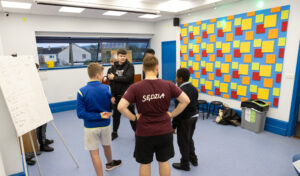A dramatic reduction in the over 200,000 children living in poverty is the only way to judge the success of the special measures announced in Budget 2024.
The enormity of the challenge we face in ensuring that every child enjoys the best possible start in life is captured each year in two significant pieces of work. Each intended to inform and guide policy.
The Child Poverty Monitor from the Children’s Rights Alliance tracks Government progress towards reducing the numbers living in poverty. This summer’s monitor made for disappointing reading.
Last June it set alarm bells ringing when it recorded 236,910 children living in poverty as well as a sharp increase in the number of children living in consistent poverty, rising from 5.2 per cent to 7.5 per cent, or almost 90,000 children.
Secondly the Poverty Income Inequality and Living Standards research by the Economic and Social Research Institute (ESRI) which set the political agenda ahead of the budget when it was published five weeks ago set out policy options to address this challenge, and assessed the likely impact of each.

Of all the policy options set out the researchers at the institute the most impactful was for better targeted child benefit supports – effectively a new tier. It was estimated that an investment of €700 Million could cut the numbers in poverty by a quarter.
It is clear from Budget 2024 that policymakers were listening – even if only in part.
The focus on the qualified child benefit payment which is aimed at the most vulnerable shows an acceptance by Government of the need for greater targeting. The €4 a week increase on top of the €12 general welfare increase while a step in the right direction is short of what had been envisioned as a policy option by ESRI researchers.
Coupled with the roll out of the hot school meal programme to an extra 900 schools, as well as increasing the home carer tax credit and the single person child carer credit by €100 and the incapacitated child tax credit by €200 the budget package does recognise that there are individuals, families and children who need permanent support and not temporary measures.
Extending Child Benefit to those aged 18 in full time education and increasing the income threshold for Working Family Payment by €54 per week are other measures which again will have the greatest impact for those families which need them most.
The bonuses and the increase in the minimum wage although welcome do fall short of the living wage limits which many seek, it is something we as a society should continue to aspire too.
As the Government continues to develop the programme of the Child Poverty and Wellbeing Unit within the Department of the Taoiseach it should do so mindful of the findings of the ESRI report. The case it makes for future targeting of supports at those in the greatest need is not only compelling it is also evidence based.

The coming days will undoubtedly see Ministers rolled out across social media, on the airwaves and in print platforming the virtues of a €2.3 Billion package responding to the cost of living crisis and the extra welfare payments put in place for families.
However even both Ministers McGrath and Donohoe in announcing the Budget recognise they were doing so in a time of uncertainty – not just for the national finances but also ever-changing global events.
In times of crisis and uncertainty we know that the inequality gap grows, we saw this during Covid. We also know that those who are vulnerable are negatively impacted the most.
In this context it is important that those measures intended to combat child poverty are effective and delivering for families.
The experiences and insights of community groups, family resource centres and other groups working with and supporting people on the ground is always key.
As a philanthropic hub, Community Foundation Ireland not only connects into a network of 5,000 community partners, we are also committed to drawing on the expertise of the best researchers in the country.
Our donors support for The Child Poverty Monitor and our partnership with the ESRI will help capture that impact by providing the best-in-class independent research. It is these findings which will in time show if Budget 2024 has it had its desired impact.

Denise Charlton is Chief Executive of Community Foundation Ireland, which has provided over €120 Million to communities since the year 2000 in support of an equality mission.